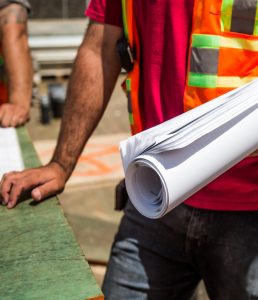The finances of trade services seem like they should be simple: You have a leaky faucet, you call a plumber, they fix it, you pay them. From the customer’s side, it appears an easy transaction. For small business owners in the trades, however it’s much more complicated.
As though ladder falls, electrical fires, and rusty nails weren’t enough to worry about, skilled tradespeople also face the dangers of Department of Revenue audits and high-volume aged receivables. So for our month of industry-focused accounting, we’re focusing week two on accounting considerations for those in the trades.
Concern #1: Getting paid.
 Performing a job, particularly if parts have to be purchased, can be a costly endeavor. If employees have to be paid for extra hours or extra help brought on, it can be even more expensive. So when customers don’t pay, you, the owner is severely put-out.
Performing a job, particularly if parts have to be purchased, can be a costly endeavor. If employees have to be paid for extra hours or extra help brought on, it can be even more expensive. So when customers don’t pay, you, the owner is severely put-out.
There are ways for business owners to protect themselves and prevent slow/no-payers. The first, most obvious step, is to take a deposit, at least enough to cover parts and materials that must be purchased. This way, even if the job is cancelled, you’re not stuck with the costs of materials you don’t need.
The second is to establish clear terms of invoicing and payment, and to make sure both sides understand and agree to them. This can be particularly important when doing commercial work, as businesses often have more rigid rules about how they are invoiced, how POs are issued, and how payments must be approved internally before being remitted.
The third is simply having a system in place by which you follow up on overdue invoices. We do accounts receivable work for some of our clients, and you would be amazed how much money can be collected by simply calling and reminding customers that a payment is overdue. Though there are exceptions, of course, most people do want to pay their bills in a timely matter, and are happy to make right on an overdue account.
Concern #2: Job-costing.
 In the prior entry, we referenced the costs associated with an individual job, such as labor and materials. However, there is also travel time to be considered, as well as overhead allocations (how you proportion out fixed costs to specific jobs). Though it can be a lot of work to set up an effective job-cost tracking system, the data it provides is invaluable for business planning and expansion purposes, and for determining profitability of different types of jobs, and for pricing strategy.
In the prior entry, we referenced the costs associated with an individual job, such as labor and materials. However, there is also travel time to be considered, as well as overhead allocations (how you proportion out fixed costs to specific jobs). Though it can be a lot of work to set up an effective job-cost tracking system, the data it provides is invaluable for business planning and expansion purposes, and for determining profitability of different types of jobs, and for pricing strategy.
In particular, tracking mileage and other travel costs can help immensely in determining how jobs are scheduled efficiently. Fuel costs alone can be significantly reduced with more strategic scheduling, as well as labor costs associated with travel time. Even things such as travel to vendors with preferred pricing can be optimized. However, if that data is not being tracked, it can’t be studied nor put to use.
Concern #3: 1099s.
 It’s common in the trades, more than any other industry, to hire short-term help for only a single job or handful of jobs. Without proper preparation, this can be very dangerous for a business owner when it’s time to file 1099s. Essentially, the IRS requires that a 1099 be filed for every contract worker who received more than $600 in cash or check for services in a calendar year. (And there are steep penalties at both the state and federal level for failure to do so.)
It’s common in the trades, more than any other industry, to hire short-term help for only a single job or handful of jobs. Without proper preparation, this can be very dangerous for a business owner when it’s time to file 1099s. Essentially, the IRS requires that a 1099 be filed for every contract worker who received more than $600 in cash or check for services in a calendar year. (And there are steep penalties at both the state and federal level for failure to do so.)
To file a 1099, you have to have a W-9 from the worker. If you paid someone for a single job in February of the prior year, it can be hard to track that individual down several months later to get a W-9 (especially if they know it means you’re trying to report their income to the IRS). We strongly recommend collecting W-9s (and Certificates of Insurance, where applicable) from contractors prior to paying them.
Concern #4: Sales tax.
 North Carolina Department of Revenue shook things up a few years ago in 2016 when they began requiring sales tax be collected on additional services. Under the change in law, sales tax is now charged on repair, maintenance, and installation of “tangible personal property”. This means that, for example, someone installing an HVAC unit would have to collect and remit sales tax on not only the unit, but on the installation service as well.
North Carolina Department of Revenue shook things up a few years ago in 2016 when they began requiring sales tax be collected on additional services. Under the change in law, sales tax is now charged on repair, maintenance, and installation of “tangible personal property”. This means that, for example, someone installing an HVAC unit would have to collect and remit sales tax on not only the unit, but on the installation service as well.
Where this becomes complicated is that the sales tax expansion does not apply to services on “real property” (i.e. homes or other buildings). However, to protect themselves, tradespeople performing services on real property should obtain Affidavits of Capital Improvement in order to confirm that sales tax is not applicable on each specific job. (This is particularly true for general contractors performing remodels, or their subcontractors.)
Because there is so much variability and “gray area” within financial accounting for the trades, we recommend you speak to your accounting professional regarding any questions you might have for your business’s unique situation. If you don’t have an accounting professional, we might be the right people for the job.
Contact us to schedule a free 1-hour consultation; we’re happy to answer your questions.
